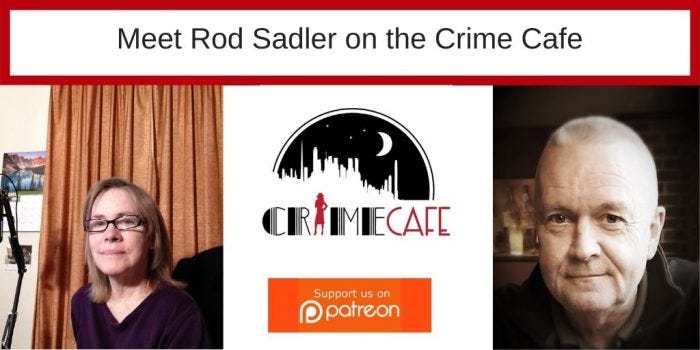Subscribe: Apple Podcasts | Google Podcasts | Spotify | Stitcher | Blubrry | Email | TuneIn | RSS | More
This episode of the Crime Cafe podcast features my interview with crime writer Rod Sadler.
Check out his thoughts about the upcoming release on parole of a convicted serial killer.
This is the Crime Cafe, your podcasting source of great crime, suspense and thriller writing. I’m your host Debbi Mack. Before I bring on my guest, I’ll just remind you that the Crime Cafe has two eBooks for sale: the nine book box set and the short story anthology. You can find the buy inks for both on my website, debbimack.com under the Crime Cafe link. You can also get a free copy of either book if you become a Patreon supporter. You’ll get that and much more if you support the podcast on Patreon, along with our eternal gratitude for doing so.
Check us out on Patreon: https://www.patreon.com/crimecafe
Debbi (00:54): But first, let me put in a good word for Blubrry podcasting.
I’m a Blubrry affiliate, but that’s not the only reason I’m telling you this. I’ve been using Blubrry Podcasting as my hosting service for my podcast for years and it’s one of the best decisions I ever made. They give great customer service, you’re in complete control of your own podcast, you can run it from your own website, and it just takes a lot of the work out of podcasting for me. I find for that reason that it’s a company that I can get behind 100% and say, “You should try this.” Try Blubrry. It doesn’t require a long-term contract, and it’s just a great company, period. It also has free technical support by email, video, and phone, so you can get a human being there. Isn’t that nice?
If you want to podcast, try out Blubrry. No long-term contract, excellent distribution, and great technical support, too, by email, video, and on the phone. I’ve included an affiliate link on this blog.
Download a PDF copy of the interview here.
Debbi: Hi everyone. My final guest of 2021 had a 30-year career in law enforcement before turning his hand to writing true crime. He has three books out: To Hell I Must Go: The True Story of Michigan’s Lizzie Borden, A Slayer Waits: The true story of a Michigan double murder, and his latest, Killing Women. I’m pleased to introduce my guest, Rod Sadler. Hi Rod. How are you doing today?
[01:34] Rod: Hello, Debbi. Thank you so much for having me. I am doing just great and I have really been looking forward to this.
[01:40] Debbi: Fantastic. Well, I have to tell you, your guest post. I really appreciate your being here, first of all, talking to us. Your guest post was most interesting, I have to say. I would think having an actual pen pal, if you’ll excuse the pun, who is a serial killer would be interesting.
[02:02] Rod: Yeah. And I will tell you, it’s much less than a pen pal. I guess it was for a short time, but when the first letter arrived—actually just to take a short side note here, if you’re ever going to start a letter to a serial killer, let me give
you a piece of advice, and this is directly from my wife. Do it with someone else’s return address. She was less than pleased when we started getting letters from him, so…
[02:33] Debbi: I can easily imagine. I can just imagine. What drew you to writing true crime in general? And the reason I
ask is that there are so many police officers that I’ve interviewed and some of them write crime fiction and some of them write true crime. How did you pick true crime? What drew to that as opposed to fiction?
[03:02] Rod: Well, it actually started as a genealogy project back in—oh my gosh—early in my career. I became a police officer in the early 80s and I worked for a campus police department. I’ll try to make this short because I can ramble on, but my great-great grandfather had served as the sheriff in the county that we live in, and so I started doing some genealogy about him just to find out a little bit more. I was going through old newspapers and I found an article from 1897 describing this gruesome murder in the small town where I grew up and it mentioned my great-great grandfather’s name, and the murder was so bizarre that I thought this would make a great book and I put it off and put it off for my entire career until I retired in 2012. And then I put that first book together and I had so much fun, I thought this is it. True crime is my retirement job.
I was going through old newspapers and I found an article from 1897 describing this gruesome murder in the small town where I grew up and it mentioned my great-great grandfather’s name, and the murder was so bizarre that I thought this would make a great book and I put it off and put it off for my entire career until I retired in 2012.
[04:09] Debbi: Hmm. Yeah. So, it started with a genealogy project. That’s very interesting. Have you always been into genealogy?
[04:19] Rod: You know, more so when I retired and I had more time. I always was fascinated by the fact that my great-great grandfather had been the sheriff, an elected official and I was able through family members to get his badge and gun and handcuffs from 1897 and those are priceless to me. In doing my research for my first book, I went to the archives of Michigan and they had the original court file from 1897 that had a handwritten statement from my great-great grandfather about what he had seen at this particular murder scene, and that to me was like gold. And so, I have become more interested in genealogy since then, yes.
[05:14] Debbi: It is an interesting subject. How much historical research apart from official records do you do on your books?
[05:26] Rod: I try to get everything that I can, and I use a great internet resource newspapers.com, which is invaluable. And because I have experience in seeking out police records through Freedom of Information Act, that’s what I try to do if the case is actually something that they might still have. And by that, I mean I was able to locate for my second book a murder in 1955, I was able to locate the original police file, mostly through attorneys that were involved in it. They were elderly, but still practicing law. My last book, which I’m sure we’ll talk about here shortly, I was able to get the entire police file and the book that I hope to have published by this summer, I was able to get a 60-year-old police file from the Michigan state police. So historic information I try to get mostly through newspapers.com and through original court documents and police files.
I try to get everything that I can, and I use a great internet resource newspapers.com, which is invaluable. And because I have experience in seeking out police records through Freedom of Information Act, that’s what I try to do if the case is actually something that they might still have.
[06:46] Debbi: That’s the safest bet, isn’t it?
[06:48] Rod: Oh, it’s the most accurate that I have found.
[06:51] Debbi: Yes. Yeah. That’s where you can get actual official things that people have said under oath and so forth.
[06:59] Rod: Yeah, exactly.
[07:00] Debbi: Yeah. How did you get interested in Don Miller’s case? You were interested before he started writing you, right?
[07:09] Rod: I’m sorry.
[07:10] Debbi: You were interested in his case before he started writing you, correct?
[07:15] Rod: I was. Early in my police career—actually before my police career—I was graduating from high school when this was going on. Don Miller was arrested for sexual assault and attempted murder of two teenagers the year that I graduated from high school. I already knew that I was going to go into law enforcement as a career. I had my college curriculum all laid out and in a couple months I was going to start at the community college, and so I kind of followed the headlines because it was a high-profile case. It was literally 20 miles from where I lived and it involved a criminal justice student by the name of Don Miller, who was the prime suspect in all of these particular incidents. And so, I did follow it while it progressed through the court system, and then when he was sentenced to prison in 1979 for 30 to 50 years, everybody thought, hey, we don’t have to worry about Don Miller anymore. Well, guess where we are today? We’re worrying about Don Miller again.
It was literally 20 miles from where I lived and it involved a criminal justice student by the name of Don Miller, who was the prime suspect in all of these particular incidents.
[08:29] Debbi: Yeah. Do you do a lot of interviews or do you mainly rely on official documents?
[08:39] Rod: I do both, actually. In the Don Miller case, one of the things that attracted me to it late in my … well, actually in retirement was the fact that over the years I had become friends, professional colleague friends with numerous people that were directly involved in that case, and that included everybody from the initial officer who took the first missing person complaint in 1977, right up to Don Miller’s own defense attorney and the prosecuting attorney that put him in prison. I probably knew 75% of the people involved in that case, and so I interviewed about 75% of the people involved in that case. And then I relied on court to transcripts and police reports.
I had become friends, professional colleague friends with numerous people that were directly involved in that case, and that included everybody from the initial officer who took the first missing person complaint in 1977, right up to Don Miller’s own defense attorney and the prosecuting attorney that put him in prison.
[09:38] Debbi: How do you keep all the information organized as you collect it?
[09:44] Rod: Oh boy, that’s a tough one. For my first book, it was just kind of a hodgepodge of notes and things, but then as I progressed to my second and my third book, I kind of came up with a system, if you will, where I simply categorize the news articles in one folder and court documents in another and interviews in another, and I try to put things chronologically. That’s how my books progress. Actually, I begin at the very end when the body is located—or bodies in the Don Miller case—and then I jump right to the beginning. So, it’s kind of like a little teaser, if you will.
[10:33] Debbi: So basically, your concern discussed in the book about the release of this person on parole is that he basically is unreleasable?
[10:50] Rod: Well, I would say yes. He is a serial killer. He’s taken the lives of four women, and he tried to take the life of a 14-year-old girl after he raped her in 1978, and it’s alarming to a lot of people that he will be released if he doesn’t get parole, but he will be released in 2031. it’s important for people to understand that Don Miller’s not in prison right now for murder. He’s only in prison right now for possessing a strangulation device in his prison cell. He was originally sent to prison for the rape and attempted murder of two teenagers, and then he was charged with two counts of second-degree murder. But before that ever went to trial, he was offered a plea deal. And that plea deal stated that if he would lead police to the bodies of two missing women, then they would reduce the charges to manslaughter. He could plead guilty to those and serve 15-year sentences at the same time that he was serving the 30 to 50 years for the rape, if that makes sense. And so, everybody at that time thought, hey, we don’t have to worry about Don Miller anymore.
Except back in the 70s, Michigan did not have a Truth in Sentencing law, and what that means is—and I’ll use myself as an example—if I were sentenced to five to 10 years today, I would have to serve a minimum of five years without any chance of parole. Back then, you might get five or 10 years in prison and be out in two or three, based on good time and things like that. And so, by the late 90s, Don Miller was ready to get out of prison and authorities found a strangulation device in his cell and he was charged with that and subsequently convicted, and that really is the only reason that he’s still in prison.
[13:13] Debbi: Now he’s in a psychiatric hospital, correct?
[13:17] Rod: No, he’s not.
[13:17] Debbi: He’s in prison? Okay. I had the impression that he claimed some kind of insanity or diminished capacity or something.
[13:27] Rod: He did. He claimed insanity. He claimed that there were demons in the house where these teens were and that he was going in to rid them of the demons. That defense fell through and he was convicted.
[13:48] Debbi: Hmm. Yeah. Let’s see—is there a usual amount of time you’ll have to research versus writing the book?
[13:57] Rod: I usually spend two or three months doing my research first and getting things organized so that I know how to go back and find something if I need it, because there is just so much. The cases that I choose, there just seems to be so much information available and so much information out there that I really have to organize it. And actually, the last book that I’ve completed that is with my agent right now, in that particular case, I had 2000 pages of police reports from 1960, and I had to categorize those into a 10-page spreadsheet, which was a task in and of itself.
[14:47] Debbi: Yes. Yes. It would be. Just getting all that together and organizing it so that it comes out in a narrative form must be a challenge.
[14:56] Rod: Oh, yes. Yes, it is.
[14:58] Debbi: I could just imagine. What authors inspire you the most, and what do you read for pleasure?
[15:08] Rod: You know, I get asked that a lot and I can remember as a kid that my favorite books were true stories. It was a series by an English author by the name of James Herriot. He wrote All Creatures Great and Small, and a whole series of books about being an English veterinarian back in the 30s and 40s. I loved that series, but I also because I was going into law enforcement became a big fan of Joseph Wambaugh, who was a huge nonfiction writer back in the 70s, and I loved his books too. And so, I would say if I had to choose two authors, those would be the two that probably influenced me the most.
[16:00] Debbi: Very interesting. I know other police officers have said that to me also that Wambaugh was an influence. He wrote very realistically about the police department.
[16:12] Rod: He did. And Los Angeles. California is a lot different than Eaton County, Michigan. but yet I still have a flair for Michigan law enforcement and I think I write about it well.
[16:29] Debbi: Very good. And what is it you’re working on now? You said you’re finishing something up that you hope to get out next year.
[16:37] Rod: Yes. I have a cold case, a 60-year-old cold case that occurred here in Michigan. It is still unsolved, and I have maybe the name of a person that they should look at that I believe is still alive and in prison right now for murder.
[16:58] Debbi: Interesting. Well, it sounds very intriguing. What advice would you give to someone interested in writing for a living?
[17:07] Rod: Oh, I would say my biggest piece of advice is that you have to practice patience. I guess maybe some people can sit down and begin writing a book and not think about it, but when I’m doing a true crime where I have to put facts down and be factual through the whole thing, you have to take time to gather that information and then you have to take time to formulate how you want to do it, and then you have to take time to do the writing. And then beyond that, the whole publishing process is a whole other animal. And so, the biggest thing I can say is to be patient with yourself.
I would say my biggest piece of advice [for aspiring authors] is that you have to practice patience.
[17:58] Debbi: Absolutely. I so agree with you. I just going to ask you something and now of course it slipped my mind. I hate when that happens.
[18:09] Rod: Welcome to my world.
[18:12] Debbi: Yeah. I’m afraid I’m joining that world. Oh, I know what I was going to ask. About the marketing. Yeah, about marketing. What do you do to market your book? Are you doing book signings? Do you do just virtual events or do just do social media, or …?
[18:32] Rod: Actually, I’ve only done one real virtual event. That was interesting. It was fun. I got to meet some other authors virtually but I do a lot of book signings. I try to throughout the year, because they’re Michigan based crimes. They are mostly in Michigan. There’s a huge—oh, what’s the term I’m looking for? A tourist stop about halfway up the state, mid-state in Clare, Michigan and it’s called Cops & Doughnuts. It is a donut shop that’s owned by 13 retired police officers, and it’s police-themed, hence the name. They have books there and they carry my books, and that to me is huge. I think that my upcoming book, I’ll be traveling north for that because that’s where that particular crime occurred, but I do a lot of book signings.
Social media is a big part, mostly Facebook. I do a little bit of Twitter, but I get discouraged by Twitter. It just seems that most of the other authors on there. Not everyone, but most of them are just looking for those likes and I haven’t found it to be a very good marketing opportunity. I’m just starting a little bit on TikTok to throw some videos out about my books to see if that helps at all. But I will say that the local media here in the mid-Michigan area has done an absolutely fantastic job with all three of my first books. It was front page in all of the local newspapers, and really word of mouth, too. Word of mouth helps. So, I kind of use a little bit of everything.
[20:43] Debbi: Oh, that’s fantastic that you got front page coverage somewhere.
[20:47] Rod: I did. I did on all three books and I was so excited about that.
[20:51] Debbi: That is fantastic. Congratulations.
[20:54] Rod: Thank you.
[20:56] Debbi: Is there anything else you’d like to add before we finish up?
[21:00] Rod: I will tell you that some people get confused with my first book, the subtitle because it’s called To Hell I Must Go: The True Story of Michigan’s Lizzie Borden, and people look at that and they go Lizzy Borden wasn’t from Michigan. It’s the way that I worded that. It should have been the true story of a woman some might refer to as Michigan’s version of Lizzy Borden.
[21:28] Debbi: But that seems kind of long, doesn’t it?
[21:32] Rod: It is. It’s very long so I just have to deal with that. I did a lot of research when I did my books. The first two, I designed the covers myself. I did some research on what to look for and how to do a good cover, how to title a book, things like that, because I got into this industry knowing nothing about it. Everything that I learned, I had to research and I’m still learning. I’ll probably be learning until the day I die about ways to improve. So again, the biggest thing I can say to anybody that wants to be a writer out there is please be patient with yourself.
[22:19] Debbi: That is so true. Patience is essential in this field.
[22:24] Rod: It is absolutely essential.
[22:26] Debbi: There’s too much hard work. There’s too much criticism, too much at stake. Too many books, the whole thing. It’s like you have to really be good and really kind of focus your efforts in the right places, I think.
[22:46] Rod: Right. Exactly.
[22:48] Debbi: That’s the thing. Well, I just want to thank you so much for being here. It was great talking to you and hearing about these cases.
[22:56] Rod: Oh, it was my pleasure and I appreciate you having me
[23:00] Debbi: Well, it was my pleasure, too, and thank you so much.
[23:03] Rod: Thank you.
[23:04] Debbi: Sure thing! In closing, I’ll just say that right now, you can get any of my books for half off from Smashwords until the end of the year, or actually the beginning of next year, because I believe the sale ends January 1st. So, pick up a copy of either of the Crime Cafe ebooks. The box set is half off and the short story anthology is free for a limited time, as well as all my novels. All half off, including my latest Fatal Connections, so download away.
To all of you, thanks so much for listening. Have a great holiday and the best wishes for the new year. My next guest after a short break will be Ellery Kane. That’s Ellery Kane, not Ellery Queen. That would be weird. Until next time, happy holidays and happy reading.
*****


















Share this post